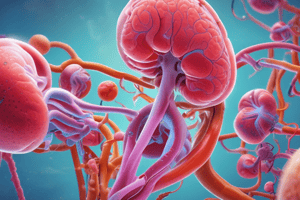Podcast
Questions and Answers
What personal history factor could indicate a chronic kidney condition?
What personal history factor could indicate a chronic kidney condition?
- Past kidney stone episodes
- Recent flu infection
- Family history of hypertension
- Elevation of creatinine for over 3 months (correct)
Which ultrasound finding is associated with chronic kidney disease?
Which ultrasound finding is associated with chronic kidney disease?
- Small, hyperechoic kidneys with indistinct cortical and medullary differentiation (correct)
- Enlarged kidney size
- Hypoechoic cortical structure
- Presence of renal cysts
Which symptom is NOT commonly associated with chronic kidney disease?
Which symptom is NOT commonly associated with chronic kidney disease?
- Hypocalcemia
- Decreased erythropoietin production
- Normochromic and normocytic anemia
- Elevated creatinine for a few days (correct)
What is a key consideration when administering fluids to a patient with suspected kidney issues?
What is a key consideration when administering fluids to a patient with suspected kidney issues?
Which of the following is a false statement regarding the treatment of kidney lesions?
Which of the following is a false statement regarding the treatment of kidney lesions?
Flashcards are hidden until you start studying
Study Notes
Differential Diagnosis Clues
- Personal history is a key indicator.
- Timeline is crucial: elevated creatinine for over three months points to chronic kidney disease.
- Ultrasound findings for chronic kidneys: small, hyperechogenic, indistinct cortex and medulla, and lack of parenchyma.
- Anemia is common, usually normocytic and normochromic due to lack of erythropoietin.
- Hypocalcemia can occur due to vitamin D deficiency.
Treatment
- Fluid therapy is essential.
- Intravenous or oral fluids should be administered depending on severity.
- Early and correct treatment can often reverse lesions and restore normal renal function within 24-48 hours.
- Monitoring crucial vital signs during fluid administration:
- Blood pressure
- Heart rate
- Oxygen saturation (to prevent congestion and pulmonary edema)
- Pulmonary auscultation (for crackles)
- Urine output
- Weight
Studying That Suits You
Use AI to generate personalized quizzes and flashcards to suit your learning preferences.





